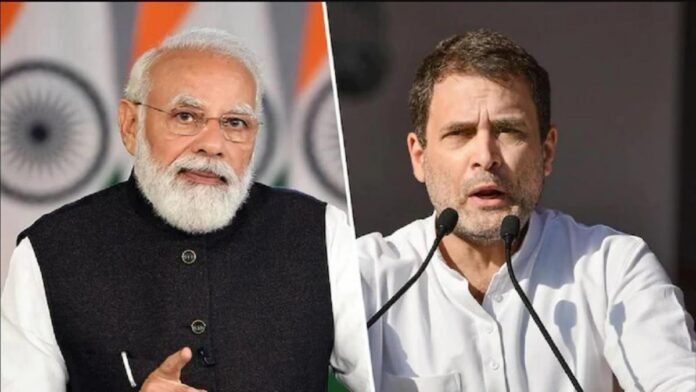Prime Minister Narendra Modi delivered a pointed dig at Rahul Gandhi, the former president of the Indian National Congress party. Modi’s statement, laden with political undertones, stirred both controversy and discussion across the nation. The Prime Minister’s words, “Pakistan is crying, wants to make shehzada…” captured attention and sparked a flurry of reactions from various quarters of Indian politics and society.
The context of Modi’s statement lies within the broader geopolitical landscape of the Indian subcontinent, particularly the strained relations between India and Pakistan. Tensions between the two nuclear-armed neighbors have been a persistent feature for decades, characterized by border skirmishes, cross-border terrorism, and diplomatic stand-offs. Against this backdrop, any reference to Pakistan by Indian political leaders often carries significant weight and implications.
Modi’s choice of words, referring to Rahul Gandhi as “shehzada” (meaning prince), carries subtle yet potent symbolism. The term has been used by Modi and his supporters in the past to portray Gandhi as out of touch with the realities of India and as someone who has inherited his political position rather than earned it through merit. By invoking this term in the context of Pakistan, Modi not only targets Gandhi personally but also seeks to underscore his perceived weakness in dealing with matters of national security and diplomacy.
The phrase “Pakistan is crying” further amplifies the rhetoric, suggesting that Pakistan is perturbed or distressed by certain developments within India. This framing serves multiple purposes: it portrays India as a formidable adversary capable of unsettling Pakistan, it positions Modi as a strong leader who evokes reactions from neighboring countries, and it insinuates that Gandhi’s political approach is somehow aligned with Pakistan’s interests, thus questioning his allegiance to India’s national interests.
However, beneath the surface of Modi’s rhetoric lies a complex interplay of domestic politics and international relations. Rahul Gandhi, despite his occasional missteps and criticisms, remains a prominent figure in Indian politics, representing the Congress party’s legacy and ideology. His family’s long-standing involvement in Indian politics, particularly his lineage as the scion of the Nehru-Gandhi dynasty, lends him both influence and scrutiny in equal measure.
Modi’s jibe at Gandhi can be interpreted as a strategic move to deflect attention from domestic challenges and rally support around the Bharatiya Janata Party (BJP) ahead of crucial elections or amidst contentious policy debates. By framing Gandhi as a figure sympathetic to Pakistan, Modi seeks to capitalize on nationalist sentiments and portray himself as the stalwart defender of India’s interests.
Moreover, Modi’s remarks highlight the enduring rivalry between the BJP and the Congress, two political behemoths vying for power and influence in India’s democratic landscape. The BJP, under Modi’s leadership, has consistently sought to marginalize the Congress party and establish itself as the preeminent force in Indian politics. By casting Gandhi as a pawn of Pakistan, Modi reinforces the narrative of the BJP as the sole guardian of India’s sovereignty and security.
However, critics argue that Modi’s rhetoric risks oversimplifying complex geopolitical realities and exacerbating tensions with Pakistan for political gain. By reducing the discourse to personal attacks and nationalist posturing, there is a danger of undermining diplomatic efforts to foster peace and stability in the region. Moreover, equating political opponents with adversaries from neighboring countries sets a troubling precedent and undermines the principles of democratic debate and pluralism.
In addition, Narendra Modi’s dig at Rahul Gandhi, wherein he suggests that “Pakistan is crying, wants to make shehzada,” encapsulates the intricate nexus of politics, nationalism, and international relations in contemporary India. While it serves the BJP’s political agenda by portraying Modi as a resolute leader and Gandhi as a purported ally of Pakistan, it also reflects the enduring tensions and rivalries that shape Indian politics. As India navigates the complexities of its domestic and foreign policy landscape, the need for nuanced and constructive dialogue becomes increasingly paramount.

